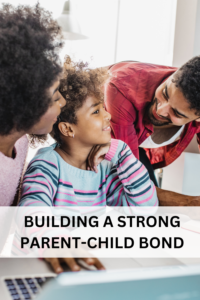
Using mindful parenting tips is a practice that can transform the way we interact with our children, fostering emotional intelligence, resilience, and a strong parent-child bond.
Here are ten mindful parenting tips to help you navigate this rewarding journey:

Hi! My name is Marra and I’m a mama and a pediatric occupational therapist who has years of experience working with children with diverse developmental needs and helping their parents navigate the ups and downs of child development.
I loved being a support person for parents learning about child development , and their child’s individual needs. I love discussing different parenting tips as well as learning from others. Mindful parenting tips are some that we can all learn from and use.
This post is all about the top mindful parenting tips. Learn how to include them in your own parenting plan. As always, you are the expert on your children and your family so take what serves you and leave the rest.

The Top 10 Mindful Parenting Tips
Be Present
Being present is one of the most important mindful parenting tips we can incorporate. Being present with your children means giving them your full attention and focusing on the moment without distractions. Here are some tips on how to be present and why it’s important:
Firstly, set aside dedicated time for quality interactions. Whether it’s playing a game, going for a walk, or having a meal together, designate specific moments when you can fully engage with your children without other distractions.
Secondly, practice mindfulness. Be aware of your thoughts and emotions in the present moment, and try to let go of any distractions or worries. When you’re mindful, you can truly be there for your children and respond to their needs and cues more effectively.
Thirdly, limit screen time and electronic devices during family time. Create boundaries around technology use to ensure that you’re not constantly checking your phone or computer when you’re with your children. This allows you to be fully present and engaged in the moment.
Being present with your children is important for several reasons. Firstly, it strengthens your relationship and fosters a sense of connection and belonging. When children feel that their parents are truly there for them, they’re more likely to trust and confide in them.
Secondly, being present helps you understand your children better and respond to their needs effectively. You can pick up on subtle cues and signals that indicate how they’re feeling or what they might need from you in that moment.
Thirdly, it creates positive memories and experiences. When you’re fully engaged with your children, you create meaningful moments that they’ll cherish and remember. These shared experiences contribute to their emotional well-being and sense of security.
Lastly, being present with your children teaches them the importance of being present in their own lives and relationships. By modeling mindfulness and presence, you’re helping them develop valuable skills for building healthy connections and managing stress and distractions.
Practice Empathy
Practicing empathy is another important mindful parenting tip. Empathy is a crucial skill for parents to cultivate in their relationship with their children. It forms the foundation of understanding, connection, and emotional support. Here are some ways parents can practice empathy and why it’s so important:
Firstly, active listening is key. When your child speaks, give them your full attention without interrupting or judging. Reflect back what they’re saying to show that you understand their perspective..
Secondly, validate your child’s emotions. Let them know that it’s okay to feel what they’re feeling, even if you don’t agree with their point of view.
For instance, if they’re angry about a situation at school, you could say, “It’s understandable that you’re upset about what happened. I would feel the same way in your shoes.”
Thirdly, put yourself in their shoes. Try to imagine how your child might be experiencing a situation based on their age, personality, and past experiences. This can help you respond with empathy rather than frustration or dismissiveness.
Lastly, model empathy in your own interactions. Show your child how to be empathetic by being empathetic yourself, whether it’s with them, your partner, or other people in your life. Children might not always listen but they are always watching so the best way to teach empathy is by modeling it.
Practicing empathy with your children is important for several reasons. Firstly, it helps strengthen your bond and build trust. When children feel understood and supported, they’re more likely to open up and share their thoughts and feelings with you.
Secondly, empathy teaches children how to regulate their emotions and develop healthy coping mechanisms. When they see you responding with empathy, they learn that it’s okay to express their feelings and that they don’t have to face challenges alone.
Lastly, empathy fosters a positive and respectful communication style within the family. It encourages honesty, understanding, and compromise, which are essential skills for navigating conflicts and building strong relationships.
lead by example
Lead by example in your own communication practices to further emphasize the importance of open dialogue in your household is an excellent mindful parenting tip.
Children learn by observing the actions of those around them, especially their parents. By demonstrating effective communication skills and actively listening to your child, you are showing them how to engage in respectful and meaningful conversations.
This sets a positive example for your child to follow and encourages them to communicate openly and honestly with you. As a parent, your behavior serves as a powerful model for your child to emulate.
By practicing active listening, empathy, and understanding in your interactions with your child, you are teaching them valuable lessons about compassion and connection.
Remember, your actions speak louder than words, so strive to embody the qualities you wish to instill in your child.
By leading by example in your communication and overall behavior, you are not only nurturing a strong and trusting relationship with your child but also equipping them with essential life skills that will serve them well in their future interactions with others.
Remember, your influence as a parent is profound, so strive to be the role model you want your child to look up to. By embodying the values of open communication and empathy, you are laying the foundation for a harmonious and fulfilling relationship with your child.,

Foster Emotional Inteligence
The next mindful parenting tip is to foster emotional intelligence. By fostering emotional Intelligence by encouraging your child to identify and understand their own emotions, as well as those of others, in order to develop empathy and strengthen their emotional connections with those around them.
Helping your child build emotional intelligence will not only support their social and emotional development but also enhance their ability to navigate complex relationships and situations with mindfulness and compassion.
Practice Mindful Communication
Next up on our mindful parenting tips is to practice mindful communication. Encouraging open communication is essential in fostering a strong relationship with your child.
By creating a safe space for your child to express their thoughts and emotions openly and honestly, you can strengthen the bond between you and your child. This open dialogue not only helps your child feel heard and understood but also teaches them the value of effective communication in all aspects of life.
By encouraging open communication, you are setting the stage for meaningful interactions and problem-solving within your family dynamic.
This foundation of trust and understanding paves the way for a healthy, supportive relationship between parent and child. Lead by example in your own communication practices to further emphasize the importance of open dialogue in your household.,

Create a Calm Environment
The next mindful parenting tip is to create a calm environment. Children thrive in environments that are calm, structured, and nurturing.
Establish daily routines, create designated spaces for play and relaxation, and prioritize activities that promote emotional regulation, such as mindfulness exercises or yoga.
Set Boundaries with Empathy
Another crucial mindful parenting tip is setting boundaries with empathy. It’s important to enforce limits and rules for your child’s behavior, but it’s equally important to do so with understanding and compassion.
By clearly communicating your expectations and consequences while also showing empathy for their perspective, you can teach your child the value of both boundaries and compassion in their relationships and interactions.
Remember, boundaries are not meant to control or restrict your child, but rather to guide them in making positive choices and learning from their mistakes.
Practice Compassionate Listening
Another crucial mindful parenting tip is the practice of compassionate listening. By truly tuning in to your child’s thoughts, feelings, and concerns without judgment or interruption, you show them that their voice is valued and respected.
This form of attentive listening not only strengthens your bond with your child but also allows them to feel heard and understood, fostering a sense of trust and open communication in your relationship.
Remember, sometimes it’s not about finding a solution, but simply being there to listen and empathize with your child’s experiences, emotions, and perspectives.
prioritize self-care
Prioritize Self-Care by modeling healthy habits and demonstrating the importance of taking care of yourself both physically and emotionally is an essential mindful parenting tip.
Remember, as a parent, you are your child’s most influential role model. By making time for your own self-care, whether it’s through exercise, meditation, hobbies, or simply setting boundaries for personal time, you show your child the value of prioritizing mental and physical wellness.
Encouraging self-care not only benefits you but also teaches your child the importance of looking after oneself in order to be able to care for others effectively. After all, you can’t pour from an empty cup.
In nurturing your own well-being, you set a positive example for your child to follow in their own self-care practices, fostering a healthy relationship with themselves and others.
Encouraging Open Communication further strengthens this bond, creating a safe space for your child to express their thoughts and emotions openly and honestly.,
Celebrate Moments of Connection
The best mindful parenting tip is to celebrate those moments of connection with your children. Cherish and celebrate moments of connection with your child.
Whether it’s a shared laugh, a heartfelt conversation, or a quiet moment of togetherness, these moments strengthen your bond and create lasting memories.

Incorporating these mindful parenting tips into your daily life can enrich your relationship with your child and support their holistic development.
Remember that mindful parenting is a journey of continuous learning and growth, and each moment offers an opportunity for connection and understanding.
Embrace the joys and challenges with an open heart and a mindful presence, nurturing a strong foundation for your child’s well-being and happiness.
